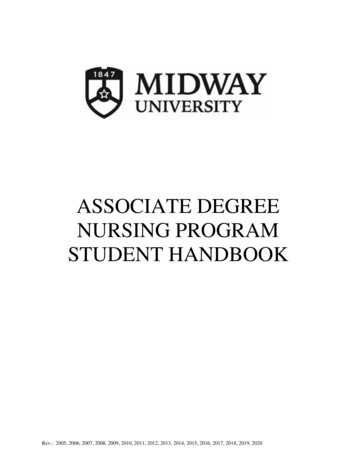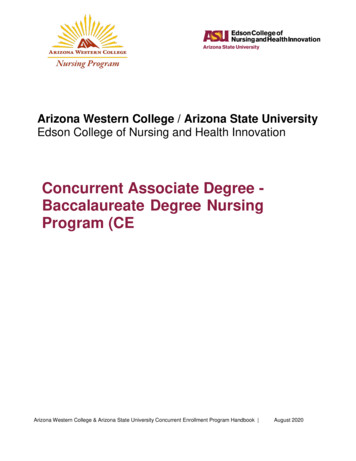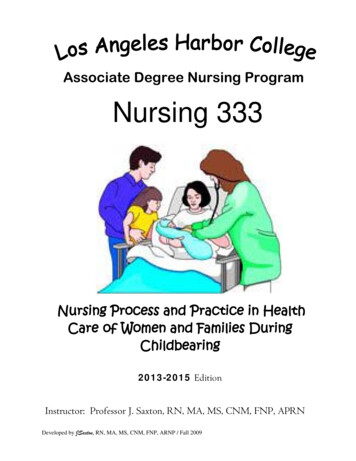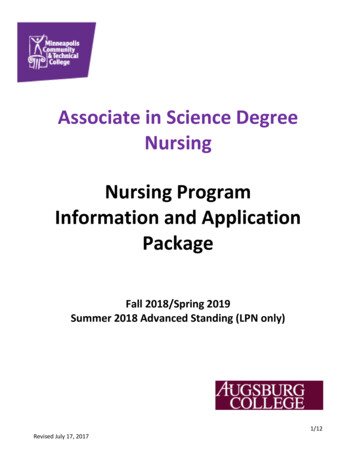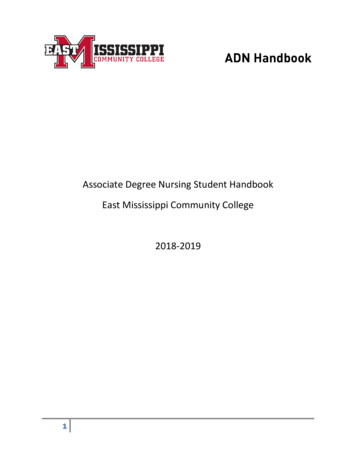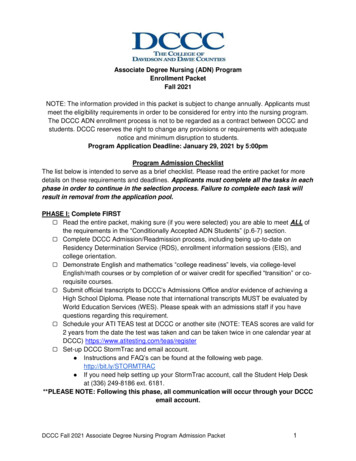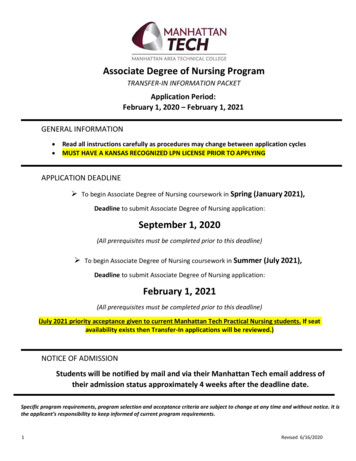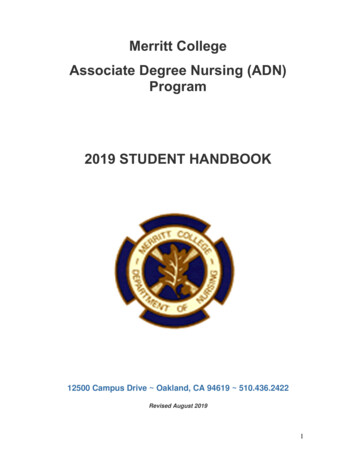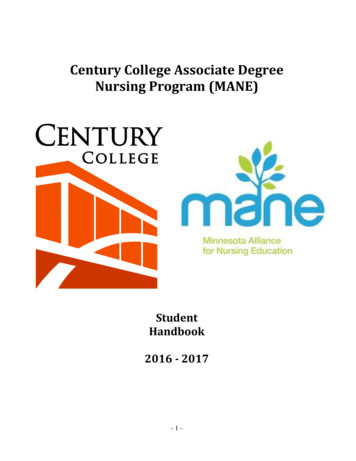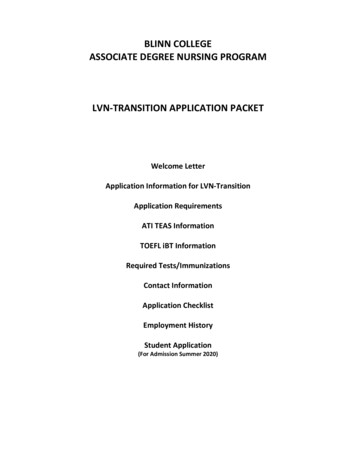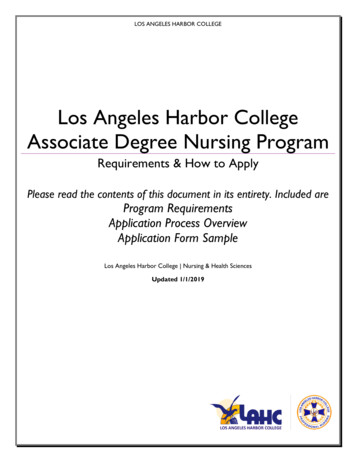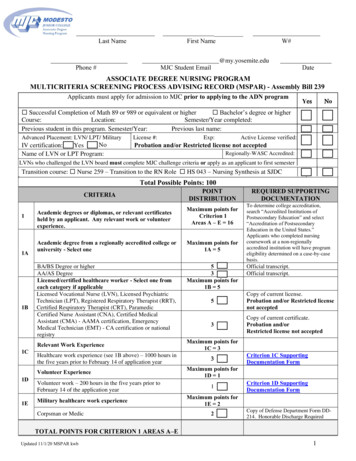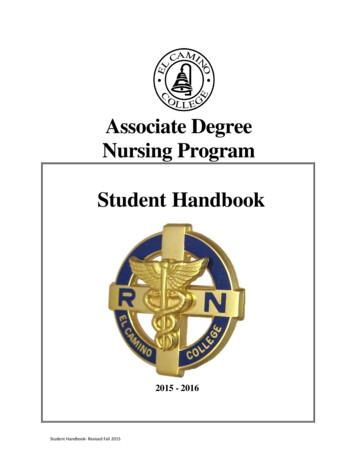
Transcription
Associate DegreeNursing ProgramStudent Handbook2015 - 2016Student Handbook- Revised Fall 2015
TABLE OF CONTENTSPHILOSOPHY AND UNIFYING THEME .Mission Statement. . 3Philosophy. . 3Unifying Theme . . . 4The Nursing Process . . 7Basic Human Needs. . 8Individual Structural Variables 9Terminal Outcomes. . 11Program Learning Outcomes (PLOs). 12Terminal Objective. .14OVERVIEWMedical Terminology and Nurse Logic for Incoming N150A Students . 15Sequence of Nursing Courses . 16Quality and Safety Education for Nurses (QSEN). . .17Grading Criteria . .25Examination Policy .25Clinical Evaluation .26Procedure for Unsafe Performance . .27Probation .28Simulation .28Progression through the Nursing Program . .29Mandatory Drop . .29Voluntary Stop-out .29Comprehensive Predictor Examination .29Re-entry Policy .29Appeals Process .29POLICIES AND PROCEDURES .Professional Behaviors. .32Academic Honesty. . .33Attendance Policy. . 34Drug Screening/Testing Policy .35Background Check .35Clinical Placement Policy . 36Clinical Preparation . . .37Confidentiality of Information. . .37Release of Medical Information . . .38GENERAL INFORMATION.Course Evaluation. .39Disability Policy .39Physical Requirements . . 40Mental and Emotional Requirements.40Electronic Devices .41Latex Allergy Policy .411
Malpractice Insurance . .41Pregnancy Policy.42Report of Industrial Injury or Illness.42Student Grievance Due Process.43Substance Abuse Policy.43Uniform Guideline/Dress Code.44Health and Immunization .45CPR Certification/Fit Testing/Influenza Vaccine . . 46RESOURCES FOR ENHANCING STUDENT LEARNING.Clinical Simulation . .47Skills Lab .47Student Success Workshops and Coordinators .47Learning Resource Center/Library Media Technology Center.47References/Periodicals .47Ella Rose Madden Room .48Writing Center .48AWARDS AND RECOGNITION.Nursing Director’s Recognition List.48Clinical Commendation Award.48Academic Excellence Award .48Nursing Service Award .48Applause Award (Faculty) .49STUDENT REPRESENTATION/ACTIVITIES .Iota Kappa Chi (IKX).49Committees.49Completion Ceremony .50GRADUATION & CANDIDACY FOR LICENSURE.50APPENDIX . . .Chain of Command. .55Clinical Improvement Plan (CIP) .56Dosage Calculation Instructions for N150A and N150B .57General Dosage Calculation Instructions .58Guide to the Appeals Process for Admission .59Appeal Application.60Appeal Checklist for Nursing Counselor Approval .61APA Guidelines .62Report of Industrial Illness . .63Student Success Referral Documents .64Release of Personal Information . .67Use of Personal Data Devices Policy . .68Letter of Recommendation Request Form . .69Evaluation of Student Handbook/Handbook Receipt Form .71PHILOSOPHY & UNIFYING THEME2
MISSION STATEMENTThe Associate Degree Nursing Program supports the mission of El Camino College. The programoffers quality, comprehensive educational opportunities and services to its diverse community,specifically those individuals aspiring to obtain the knowledge, skills, and attitudes required of aRegistered Nurse.PHILOSOPHYThe Associate Degree Nursing Program at El Camino College is based on a unifying theme thatoffers a model from which the curriculum is organized. This unifying theme identifies the nursingprocess as its organizing structure and is integrated with the concept of the Basic Human Needswherein each individual is believed to be a biopsychosocial being with a set of Basic HumanNeeds. Incorporated within the concept of Basic Human Needs is the belief that each individual isunique due to structural variables. In addition, the faculty believes that:The INDIVIDUAL is of central importance, has inherent dignity, and is worthy of respect andcare simply because he/she exists as a unique biopsychosocial being. The individual’s right offreedom of choice is primary, and an individual’s choice is a result of personal and social values. Itis the faculty’s obligation to influence and educate for positive choices, but it is also necessary toaccept and respect the individual’s ultimate choices.SOCIETY is made up of individuals who have joined in a system of relationships to achievecommon goals. These common goals revolve around the system of values and a set of practicesthat are organized for the protection of the individual, for the education and enculturation ofsociety’s members, and for the welfare of all.HEALTH and illness are dynamic, directional concepts viewed on a horizontal continuum. Healthis the ability to mobilize energy and resources to meet all of the Basic Human Needs. Illness is animbalance or disruption in the ability to meet any of the Basic Human Needs.NURSING incorporates principles from the behavioral, biological, and physical sciences. Nursingis concerned with the quality of the health of individuals and their relationships within society.Nursing activity within the Associate Degree Nursing Program at El Camino College is directedtoward assisting the individual as a holistic being to meet his/her Basic Human Needs in order tomaintain or regain an optimum level of health.STUDENTS differ in goals and objectives. The faculty accepts the student as an individual, andrecognizes that students differ in learning needs related to age, sex, culture/ ethnicity,socioeconomic background, educational preparation, clinical interest, and learning styles. Studentsin the Associate Degree Nursing Program at El Camino College are expected, as adult learners, tobe self-motivated and self-directed. In addition, students are expected to exercise critical thinking,to realistically self-evaluate, to assume responsibility for learning, and to utilize availableresources to meet their learning needs. The learning program fosters these characteristics and isdesigned to prepare the student for the practice of nursing as it is today and as it will be in thefuture. Program learning outcomes direct students towards those competencies that a student must3
demonstrate to practice within the profession of Nursing. The learning outcomes focus onProfessional Practice, Communication, Evidence-Based Nursing Process, Health Education,Teamwork and Collaboration, Management of Care, and Safety.TEACHING involves the structuring of content for student learning that allows free exchange ofideas. The teacher is one who raises questions and issues for dialogue with students, prescribes andprovides learning experiences in a logical sequence, provides a variety of resources to meet theindividual needs of the students, and evaluates individual progress. The teacher supports thestudent in his/her educational endeavors and encourages each student to utilize the resources fromwithin the college, the nursing community, as well as family, friends, and community services. Inaddition, the teacher facilitates the problem-solving process, guides the student’s self-evaluationprocess, and maintains expertise in nursing practice.The GRADUATE of the Associate Degree Nursing Program at El Camino College is prepared topractice at an entry level, commensurate with prevailing practices. An individual graduate is ableto join the health team at the Associate Degree Nursing level and provide direct nursing care in ahealth care setting that includes professional nursing supervision and consultation. AssociateDegree Nursing education at El Camino College provides upward and lateral mobility for careeroptions. Graduates are encouraged to continue their education to earn a BSN and to act asadvocates and leaders for health care in the surrounding community.The GRADUATE of the nursing program at El Camino College has acquired the knowledge,skills, and attitudes inherent in the three integrated roles basic to Associate Degree Nursingpractice and functions at a level three of the program learning outcomes: provider of care, managerof care, and member within the discipline of nursing. In each of these roles, decisions and practiceare determined on the basis of knowledge, skills, the nursing process, and established protocols ofcurrent evidence-based practice.As a provider of care the graduate’s professional practice is characterized by accountability andcritical thinking as demonstrated by the use of evidence-based practice and patient-centered care.The graduate is clinically competent and aware of the safety needs of the patient. The graduatecommunicates and educates patients and their families regarding health care issues and practiceswithin the ethical and legal framework of nursing.As a manager of care the graduate works within the boundaries of professional practice in acollaborative manner, communicating effectively with patients and other health care teammembers. The graduate is accountable and able to manage human, physical, financial andtechnological resources to provide the highest quality care to diverse groups of patients withvarying health care needs.As a member of the discipline of nursing, the graduate is characterized by a commitment toprofessional growth, continuous learning, and self-development. The graduate practices within theethical and legal framework of professional nursing and is responsible for assuring high standardsof nursing practice.4
UNIFYING THEMEThe organizing structure of the El Camino College Associate Degree Nursing Program’s unifyingtheme is the Nursing Process and the concept of the biopsychosocial being. The curriculum definesthis process as a systematic method of identifying problems arising from Basic Human Needs andassisting the individual to recognize and cope with these problems throughout the life cycle.Central to the Nursing Process is the concept of the Basic Needs. Each individual is believed to bea biopsychosocial being who has a set of seven basic needs: physical integrity, affiliative,ingestive, excretory, oxygen-carbon dioxide exchange, sexuality, and activity-rest. Incorporatedwithin this concept are the structural variables. A person possesses a unique structure based on thevariables of age, sex, spirituality/religion, cultural-ethnicity, education/occupation, relationalaffiliation and position on the health-illness continuum.5
Unifying ThemeStudent Nurse Adult LearnerLife ExperiencesFormal EducationCultural BeliefsLearning StylesSupport SystemsGraduate Nurse Nursing ProcessBasic Human NeedsIndividual Structural VariablesThreads:Growth & DevelopmentCommunicationLegal/Ethical IssuesPharmacologyCritical Thinking6Provider of CareManager of CareMember of Profession
THE NURSING PROCESSSteps in the nursing process using the Basic Human Needs concept are assessment, diagnosis,planning, implementation, and evaluation.Assessment:To identify and document changes in the patient’s health status which interfere with the ability tomeet Basic Human Needs.Diagnosis:To establish a standardized statement about the health of a patient for the purpose of providingnursing care. Nursing diagnoses are developed based on data obtained during the nursingassessment.Plan:To develop an individualized nursing care plan based on nursing diagnoses, Basic Human Needs,structural variables, and plan interventions that follow established nursing protocols by:establishing priorities for care based on the patient’s identified needs;identifying short and long-term patient goals.Implementation:To apply established nursing protocols to an individualized plan of care according to theprioritization of a patient’s needs and structural variables. Implementation participates in theprescribed medical regimen by assessing, delegating, and providing follow-up care to patients in asafe manner.Evaluation:A systematic determination of the significance of nursing interventions delivered to patients inmeeting short and long-term health care goals. Evaluation identifies the need to tailorinterventions to meet the patient’s needs and /or modify the plan of care as necessary.Major Threads of the ProgramThe unifying theme of the El Camino College Associate Degree Nursing Program can be visualizedas a prism focusing the rays of light. The light illustrates students entering the nursing program. Asadult learners, students bring with them life experiences, formal education, knowledge, and culturalbeliefs that can be likened to rays of light reaching out for further growth and direction. The prismrepresents the nursing program, illuminating their range of knowledge and experience. These arefocused by the nursing process into patterns of light that illustrate the Associate Degree nursinggraduate who has acquired the knowledge, skills, and attitude inherent in the three integrated roles ofprovider of care, manager of care and member within the discipline of nursing. The major threadsintegrated throughout the curriculum are growth and development, communication, legal/ethicalissues, pharmacology, and critical thinking. These threads identify areas of learning within thecurriculum that are ongoing and essential in order for the student to help patients meet their BasicHuman Needs. (Figure 1)7
BASIC HUMAN NEEDSIntegrated with the Nursing Process is the concept of the Basic Human Needs. Each individual isbelieved to be a biopsychosocial being who has a set of seven Basic Human Needs. These needs arephysical integrity, affiliative, ingestive, excretory, oxygen-carbon dioxide, sexuality, and activityrest. Incorporated within this concept are the structural variables. A person possesses a uniquestructure based on the variables of age, sex, religion, culture/ethnicity, education/occupation,relational affiliation, and ones’ position on the health-illness continuum.Physical Integrity NeedMotivating Forces: Damage or threat of damage to the anatomical structure.Goal: Preservation of the patient’s physical apparatus.Nursing Involvement: Protecting the patient by providing a safe environment, performingnursing tasks in a safe manner, m
Sep 15, 2015 · within the college, the nursing community, as well as family, friends, and community services. In addition, the teacher facilitates the problem-solving process, guides the student’s self-evaluation process, and maintains expertise in nursing practice. The GRADUATE of the Associate Degree Nursing Pro
